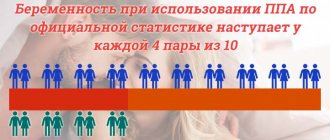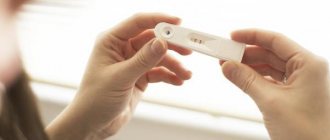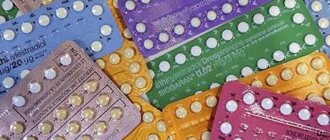When is conception possible?
Misunderstandings and questions usually arise due to the fact that there are some difficulties with the formulations regarding the likelihood of conception. From the point of view of medicine and science, conception is possible only when there is a mature egg cell ready for fusion. And conception itself (the fusion of gametes and the exchange of DNA information) occurs only during the ovulatory period, which includes the day of ovulation itself and the day after it. The fact is that the egg lives no more than 24-36 hours after it leaves the follicle on the surface of the ovary, and only during these hours is it possible for it to merge with the sperm.
But pregnancy can actually occur even if sexual intercourse itself was not carried out on the day of ovulation, but several days before it. This happens because male reproductive cells have greater vitality, and they are always ready to merge. On average, a sperm lives from 3 to 5 days, sometimes up to 6 days, and therefore unprotected sexual intercourse performed 3-4 days before expected ovulation may well lead to pregnancy , the sperm will simply have to “wait” for the release of the female gamete from the follicle . The most resilient will be able to do this.
- Menstruation
- Ovulation
- High probability of conception
Ovulation occurs 14 days before the start of the menstrual cycle (with a 28-day cycle - on the 14th day). Deviation from the average value occurs frequently, so the calculation is approximate.
Also, together with the calendar method, you can measure basal temperature, examine cervical mucus, use special tests or mini-microscopes, take tests for FSH, LH, estrogens and progesterone.
You can definitely determine the day of ovulation using folliculometry (ultrasound).
- Losos, Jonathan B.; Raven, Peter H.; Johnson, George B.; Singer, Susan R. Biology. New York: McGraw-Hill. pp. 1207-1209.
- Campbell NA, Reece JB, Urry LA ea Biology. 9th ed. - Benjamin Cummings, 2011. - p. 1263
- Tkachenko B. I., Brin V. B., Zakharov Yu. M., Nedospasov V. O., Pyatin V. F. Human physiology. Compendium / Ed. B. I. Tkachenko. - M.: GEOTAR-Media, 2009. - 496 p.
- https://ru.wikipedia.org/wiki/Ovulation
For successful conception, not only two mature and active germ cells are important, but also some accompanying factors. If a woman has heavy cervical discharge on the eve of ovulation, then the acidic environment of the vagina becomes less aggressive due to the alkaline environment of the cervical mucus. In this case, a larger number of male germ cells will have the opportunity to reach the fallopian tubes and calmly wait in the wings there.
After the egg leaves the follicular cavity, it can be fertilized in two situations:
- if sperm are already in the genital tract and they remain viable and motile;
- if male reproductive cells reach the ampullary part of the fallopian tube within 24-36 hours from the moment of ovulation.
Thus, the time of 3-4 days before ovulation fits well into the beginning of the fertile period, when unprotected sex and interrupted sexual intercourse can lead to pregnancy.
Exceptions to the rules
Sometimes on thematic women's forums and in communication with real women, you can hear statements that you still managed to get pregnant after sex, which took place a few days after ovulation.
Here you need to understand that we are talking not about sexual intercourse after ovulation, but about late ovulation, about a shift in the day of release of the egg at a later date, which the woman was not aware of. But sometimes so-called double ovulation also occurs, which can also theoretically cause pregnancy, even if the act, in the woman’s opinion, was carried out later than the expected date of release of the oocyte from the follicle.
Late ovulation
This is considered to be the release of an egg in a time exceeding that expected due to the lengthening of the first phase of the cycle. This condition is associated with hormonal imbalance, usually with late or insufficient production of LH and estrogen deficiency. And also the reason may lie in a reduced level of FSH, which is why the follicle grows slowly.
Ovulation may occur later in women who have recently had an abortion, or if their cycle has recently begun to resume after childbirth. Strong feelings, psychological instability, emotional turmoil and stress are the causes of menstrual irregularities. Ovulation can be late when traveling, changing climate and time zone, since all the settings of the “biological clock” are lost.
Late ovulation sometimes occurs due to the abolition of oral contraceptives, as well as after the flu or acute respiratory viral infection that a woman has had. The reasons may lie in sexually transmitted infections, obesity, disruption of the ovaries, hypothalamus and pituitary gland, thyroid gland, and adrenal cortex.
If pregnancy occurs, the risk of spontaneous abortion, miscarriage, and fetal development abnormalities increases, since when overripe, the quality of the genetic material of the female reproductive cell suffers, and the endometrium is less ready for implantation, which is fraught with the development of pathologies of the chorion and placenta.
Double ovulation
The very phenomenon of double ovulation among doctors still causes professional disputes and doubts. Many believe that two eggs cannot ripen sequentially twice per cycle; only simultaneous maturation of two follicles and the release of two eggs on the same day are possible. There are also supporters of a different opinion, who claim that in an atypical cycle, the sequential release of two eggs is quite possible.
With simultaneous double ovulation, everything is clear - instead of one, two germ cells come out either from one ovary or from different ones. In this case, when both cells are fertilized, twins can be born - children unlike each other, perhaps even of different sexes. If one of the eggs, for reasons unknown to science, splits on the 3-4th day of zygote fragmentation, then there is also a chance to give birth to triplets, with two being same-sex and similar twins, and one on its own.
Things are much more complicated with double ovulation, in which there is a certain time gap between the first and second. It can be several hours or several days, but no more than seven days. This is exactly how long it takes for the corpus luteum to enter the flowering stage and begin to produce significant doses of progesterone, which suppress the activity of the follicles.
Double ovulation is a rare occurrence. Typically, this can occur as a hormonal disorder of ovarian function, for example, against the background of hormonal stimulation of ovulation. The first ovulation is stimulated, and the second can be spontaneous, for example, 3-4 days after the first.
Pregnancy can occur during double ovulation. If this did not happen the first time, it is quite possible to conceive the second time, and the woman herself will not even think that she now has a viable egg. For her, the period will be barren, because all calendars and calculators say so. Double pregnancy during ovulation with a temporary gap can also happen, but this is a completely unique phenomenon. Usually, the second embryo cannot take hold in the uterine cavity, since the first one has already been implanted there, and there are no conditions for implantation and development of the second one. In world practice, there are only a few cases where both embryos implanted in a woman’s womb, but in all cases the difference in ovulation was no more than three days.
If a woman is being treated for infertility, she is prescribed hormonal therapy, such “jokes” of nature can be explained, but science does not yet know for sure the nature of natural repeated ovulation, which happens without hormones.
Chances in percentage
Of course, the closer to the day of ovulation, the higher the probability of conception, and from this point of view, the prospect of conceiving a baby during sex 1-2 days before the release of the oocyte is much higher than with sexual intercourse 3-4 days before.
The likelihood that partners will become parents increases if they are young and healthy. After all, with age, the quality of reproductive cells decreases in both men and women.
In women, the frequency of anovulatory cycles, in which ovulation does not occur at all, increases with age, and therefore the likelihood that after 35 years of age a woman will become pregnant the first time during coitus three days before ovulation is significantly lower than the chances of a 25-year-old woman in similar circumstances .
According to reproductive specialists, the maximum chance of becoming pregnant exists in young and healthy women if they have contact on the day of ovulation. It is estimated at 33-34%. If unprotected intercourse took place 3 days before ovulation, then the probability can be estimated at approximately 16%. If a woman has crossed the age limit of 35 years, then the probability is no higher than 7%, and for women over 40 years old - no more than 1%. The age of the man also plays a role. The younger and healthier a man, the higher the likelihood that his sperm will be able to “last” in the female genital tract for 3-4 days.
You can get pregnant not only with direct ejaculation into the genital tract, but also with interrupted sexual intercourse. Since male reproductive cells suitable for fertilization can be contained in certain quantities in the precoital physiological lubricant, which is produced in men at the time of sexual arousal. Sperm entering a woman's external genitalia can also cause pregnancy, but at the same time fewer germ cells enter the genital tract, and the chances that they will survive to ovulation are rapidly decreasing.
Sex and sperm: not everything is so simple
A large number of women who had unprotected contact before ovulation eventually suddenly find out about their interesting situation, not understanding how this could happen, because there were “safe days”.
So how then does pregnancy occur if there was no sexual intercourse on the day of ovulation? And the “culprit” of such an unexpected conception is the sperm, which can be very tenacious compared to the female egg. Its eyelid is longer than that of its female counterpart, and it can hide in the “folds of the terrain” and eagerly await the meeting with the egg. For potential parents, such a meeting may come as a surprise.
How durable is male sperm? Everything here is individual and depends on numerous factors. However, it is known that sperm can remain viable in a woman’s uterus for up to 7 days, with each of which their ranks are emptied and their potential decreases. But everything is very individual and depends on many factors:
- the quality of the sperm itself;
- acidity of the vaginal microenvironment;
- hygiene procedures, such as douching;
- taking medications;
- the body temperature of a man during the formation of semen and of a woman after “receiving” it.
Useful tips for those planning pregnancy
If it is not possible to have sexual intercourse at another time, then 3 days before ovulation is a completely appropriate moment. Simple tips will help increase your chances of conceiving:
- You should not use lubricants during intercourse;
- after sex, you need to lie quietly for about 40 minutes, throwing your legs higher so that as many male reproductive cells as possible have time to reach the fallopian tubes (usually this journey takes about 40 minutes);
- You should not douche after sexual intercourse.
The best way to increase your chances of conceiving is to have repeated sexual intercourse the day before ovulation, on the day of ovulation and a day later, or at least every other day.
How many days before ovulation can you get pregnant?
The likelihood of fertilization and pregnancy entirely depends on the phase of a woman’s menstrual cycle. That is why many women, for the purpose of contraception or, conversely, to increase their chances of pregnancy, use the calendar method, in which “dangerous” and “safe” days for sexual relations are calculated.
Some girls calculate and determine the exact day of ovulation, which usually occurs approximately in the middle of the cycle, in various ways. At the same time, most beautiful ladies doubt whether it is possible to get pregnant before ovulation, or whether the “dangerous” period begins from this day.
In fact, the calendar method is the most unreliable method of contraception, because, according to most modern doctors, there are no “safe” days during a woman’s entire menstrual cycle. Nevertheless, the probability of conception is indeed directly related to the onset of ovulation, and on this day it is at its highest. You should also be especially careful a few days before the peak moment. In this article we will tell you how many days before ovulation you can get pregnant, what circumstances this depends on, and from what time you should be especially careful.
As already noted, it is possible to become pregnant as a result of sexual intercourse in absolutely any phase of the expectant mother’s menstrual cycle, however, the probability of successful conception may vary. Fertilization itself in a woman’s body can only occur after the egg leaves the follicle. However, if the spouses have had sex before this point, this does not completely exclude the possibility of pregnancy.
This is explained by the fact that sperm can remain viable while in a woman’s genital tract for up to 7 full days. In this case, the vagina should
Source
Tips on how to get pregnant during ovulation
- Do not use lubricants or grease. These products contain substances harmful to sperm, so the process of conception may be delayed.
- Intimacy at intervals. Doctors advise having sex once every 3 days. During this time, the sperm will accumulate a sufficient number of sperm to fertilize the egg.
- Proper nutrition. The diet should be balanced, with plenty of seafood, vitamins and microelements. Several months before a planned pregnancy, women begin to drink folic acid, 1 tablet per day. Drinking a large amount of water also has a beneficial effect on conception, which speeds up the circulation of fluid in the body and sperm make their way to the egg faster.
- Take care of your health. Avoid fertilization during the season of colds and viral attacks, because taking antibiotics during pregnancy is unacceptable. To support your immune system, take vitamins.
- Age limits. If one of the partners is under 30 years old, the chances of fertilization are 15% in each month. After a year of attempts with the condition of full health of both partners, the probability increases to 90%. After turning 30, the chances drop sharply.
You can get pregnant 3 days before ovulation
Is pregnancy possible?
Girls who became pregnant 3-5 days before ovulation, just today the 0-vulation test is 150% positive (I didn’t do it yesterday), the second line is brighter than the one that is always on the test. And the last sex was on Sunday evening (12.08.). I think ovulation is tonight or tomorrow. Now my husband is fasting, so *** is not allowed. Is it possible to get pregnant? Who did this happen?
It is impossible to get pregnant 3-5 days before O, only during ovulation, because... if there is no egg yet, then B is impossible. If you mean that sex happened a few days before O, and then B came, then yes, this is possible.
In fact, priests say that fasting during Lent is not a sin. If one of the spouses does not agree to give up sexual activity, then the other must give in and this will not be a sin. I say this from the words of the priest who lives in the next apartment.
In fact, priests say that fasting during Lent is not a sin. If one of the spouses does not agree to give up sexual activity, then the other must give in and this will not be a sin. I say this from the words of the priest who lives in the next apartment. Are you married?
No, not yet married. Father-in-law is a priest. Yes, only if one of the spouses does not fast, then PA is possible. But my husband is strict with this. In general, they say that conceiving during Lent is not advisable.
In theory (and it helped me in practice, but we wanted a son) this is the first half of the cycle. Those. intercourse the day before ovulation and earlier.
sperm X (girl) are more tenacious and slower, i.e. they are more likely to reach the egg over a longer period of time (i.e. sexual intercourse should be BEFORE ovulation)
sperm Y (boy) are faster and less viable - they get to the eggs faster, i.e. In order for them to make it on time, the egg must be ready for fertilization by the time of sexual intercourse.
Source
Chance of getting pregnant 4 days before ovulation
Is it possible to get pregnant before ovulation?
Is it possible to get pregnant before ovulation or is it a myth? Disagreements usually arise only because of the wording of the question. Yes, pregnancy can occur if sexual intercourse occurs before the egg leaves the follicle. But only conception occurs after this. Let's talk about how you can increase or decrease the chances of conception in the event of sexual intercourse that occurred earlier than ovulation.
Is it possible to get pregnant if you were pregnant 1, 2, 3, 4 days before ovulation, is this possible? Yes, quite, if the vaginal microflora is alkaline and the sperm are “tenacious”. Naturally, those who want conception to occur should try to do everything so that as many sperm as possible remain viable by the time the egg leaves the follicle. This means that you should not, especially in the first hours after sexual intercourse, douche or inject various medications into the vagina. You can wash your genitals with water. But you need to allow sperm to penetrate the uterus, which means that after intercourse you should lie down for a while, preferably with your pelvis raised (you can put a pillow under it).
Probability of getting pregnant on the day of ovulation
Ovulation is a common condition that occurs in girls approximately in the middle of the cycle. But what is the probability of getting pregnant on the day of ovulation, the day before or after? Let's look into this issue.
Pregnancy during conception at the time of ovulation
To predict the likelihood of getting pregnant two days before ovulation or directly during it, it is necessary to understand the characteristics of the production of female cells and the lifespan of male cells.
From the first day of menstruation, a vesicle grows - a follicle, in which a cell is subsequently born. After a few days, it grows to its maximum value, which indicates the readiness of the cell. At this moment, the vesicle ruptures, accompanied by the release of luteinizing hormone (LH). The cell begins to move towards the uterus, gradually moving along the fallopian tube. Assessing the probability of getting pregnant on the day of ovulation, we can safely say – maximum. The female cell has matured and is moving. If she meets a sperm at this time, fertilization is inevitable.
The cycle will then be completed by pregnancy if the cell successfully attaches to the uterus. If the sperm is not ripe, the cell dies and after 14 days menstruation begins.
Accordingly, the likelihood of getting pregnant the day after ovulation is very low. The functioning of the cell lasts for a day. Very rarely, it can increase to 36 or 48 hours. That is why you need to be able to identify the exact moment so as not to miss the moving cell.
To increase your chances and understand the likelihood of getting pregnant on the day of ovulation (the forum confirms the advice of experts), you need to use any available options for identifying it:
Calculation. Knowing the length of the second phase, which is always equal to 14 days, it is enough to subtract this figure from your cycle duration. Having counted the resulting result
Source
Puzyatka.ru - site about pregnancy, childbirth and education
High probability of getting pregnant between the 8th and 20th day of the cycle
Overlapping the life spans of the egg and sperm, it can be argued that favorable days for conceiving a child, i.e. the days when a girl could get pregnant - provided she had a regular menstrual cycle (clear 26-day or clear 28-day) - is the middle of the cycle, plus or minus five to six days from this middle.
Based on this, we can say with confidence: if unprotected sexual intercourse occurs these days or a condom breaks while protected, then the probability of pregnancy in this situation is quite high. During this period, the girl could become pregnant and the question becomes urgent: what to do if the girl becomes pregnant? Everyone must answer this for themselves.
When is the likelihood of getting pregnant through unprotected sex low?
On all other days. If sexual intercourse occurs closer to the beginning of menstruation, for example, two to three days before menstruation or towards its end - on the fourth, fifth, sixth and seventh day of the cycle, the lower the likelihood of pregnancy. But not 100%. Why is that? Because sometimes it happens that sperm lives longer or ovulation shifts to a later or earlier date. Therefore, all calculations are quite conditional.
But a certain rule still exists. It indicates the likelihood of pregnancy. Under the condition of a regular menstrual cycle, safe (closer to the end of menstruation) and dangerous days of the cycle (closer to the middle of the cycle) are distinguished.
Can a girl get pregnant during her period?
It is almost impossible to get pregnant during menstrual bleeding.
The exception is cases when ovulation for some reason occurred too early. But this happens extremely rarely. However, doctors are categorically against sex during menstruation.
This can be explained very simply - the likelihood of developing inflammatory processes in the uterus and endometriosis increases. To avoid harming yourself, you should abstain from sex during menstruation.
Sperm in the vagina - not 100% pregnancy
One more thing. If sperm gets into the vagina, this does not mean that pregnancy will occur one hundred percent. After all, a girl may not ovulate in every cycle.
In addition, the girl may have some additional factors that contribute to the failure of pregnancy. There may also be permanent causes of infertility or infertility in a certain cycle (for example, the corpus luteum is not fully formed or the follicle is not mature).
Infertility is a pressing problem
Not all men are able to conceive; if a man has signs of infertility, pregnancy does not occur.
It cannot be guaranteed that if on one of the dangerous days, for example the 14th, sperm gets into the vagina, the girl will definitely become pregnant. But the chance is high.
Here we need to remember that there are many infertile couples in the world who can have regular sex for many months, and pregnancy occurs only by the end of the year.
Pa 2 days before ovulation
Pregnancy with the last PA 2-3 days before ovulation. Is it possible in reality?
I had: we were 21, I was 6 days old. Daughter, as you would expect. Now I have ulcers for half a day, so no one will survive even with a perfect spermogram) Here both factors: both maternal and paternal, must coincide.
Good) Spermatozoa do not live on their own, only in a favorable environment, and this is watery and ulcer, in a creamy environment they can, but not a fact, they die in a bed and a dry one. Everything must match)
katty //4891, let's check :) or rather, we are already doing this :) and about the BU - it is an excellent environment for sperm, they can live in it longer
Oh girls, your stories give me hope. I just see that all the children turned out to be daughters. My husband will be happy if we get another princess))))
oooooooh, I’m also tormented by the same question, only it’s the other way around for me. I'm late. I'm looking at the charts right now. Just like you had B, but since I didn’t (Well, no matter, everything will be OK)))))
Olya, if my husband’s SG is good, then everything is fine.) On the contrary, I came to the conclusion that half an O. in a day or every other day is not our option, I need to get exactly to O.
On average, a woman's menstrual cycle lasts 24-32 days. During this period it is great
Well, since I had already been planning for more than 6 months, of course I took the test before the delay. but honestly, I didn’t even hope for 2 stripes.
Source
Conception a few days before ovulation + first signs.
I read somewhere on the Internet that it was theoretically 14%. And at the same time, in order to plan a girl, they advise just a few days before ovulation.
It’s just that in the last 2 planning cycles we tried to coincide with ovulation (I checked it using tests and symptoms), but in this one, since we didn’t plan because of the upcoming MRI, we didn’t specifically start ovulating. Well, in the end, it was decided to postpone the MRI anyway, because no one canceled the 14% probability. But I wonder how many of these people actually conceived 3-4 days before ovulation?
Plus, my mother tells me that if I were pregnant, I would have felt something already. Today is 4 DPO, but I don’t feel anything. Normal PMS, my chest hurts as usual, my mood deteriorates as usual, even my throat is often in the second phase it hurts. Has anyone had this happen - that there is normal PMS, and then pregnancy occurs? And in the end, did these signs of PMS smoothly flow into signs of pregnancy or, on the contrary, stop?
Answered: 54
Thank you! It’s just that my mother somehow felt that she was pregnant very early, with the 2nd and 3rd for sure. She doesn’t remember the 1st pregnancy. Intuition, probably:)
Thanks for the answer! Well, the ovulation test showed a clear second line and after 12 hours all the signs of ovulation appeared: my right side and side always ache and my chest starts to hurt. So I’m 99.9% sure, but just in case I’m writing a scatter which is 3-4 days before ovulation.
If you read the community, you’ve probably seen posts with 15-week-old young ladies who have no morning sickness, no stomach, and generally don’t feel pregnant and are panicking about it. Do you want to feel something even before implantation?
Conception a few days before ovulation + first signs.
I read somewhere on the Internet that it was theoretically 14%. And at the same time, in order to plan a girl, they advise just a few days before ovulation.
It’s just that in the last 2 planning cycles we tried to coincide with ovulation (I checked it using tests and symptoms), but in this one, since we didn’t plan because of the upcoming MRI, we didn’t specifically start ovulating. Well, in the end, it was decided to postpone the MRI anyway, because no one canceled the 14% probability. But I wonder how many of these people actually conceived 3-4 days before ovulation?
Plus, my mother tells me that if I were pregnant, I would have felt something already. Today is 4 DPO, but I don’t feel anything. Normal PMS, my chest hurts as usual, my mood deteriorates as usual, even my throat is often in the second phase it hurts. Has anyone had this happen - that there is normal PMS, and then pregnancy occurs? And in the end, did these signs of PMS smoothly flow into signs of pregnancy or, on the contrary, stop?
Answered: 54
Thank you! It’s just that my mother somehow felt that she was pregnant very early, with the 2nd and 3rd for sure. She doesn’t remember the 1st pregnancy. Intuition, probably:)
Thanks for the answer! Well, the ovulation test showed a clear second line and after 12 hours all the signs of ovulation appeared: my right side and side always ache and my chest starts to hurt. So I’m 99.9% sure, but just in case I’m writing a scatter which is 3-4 days before ovulation.
If you read the community, you’ve probably seen posts with 15-week-old young ladies who have no morning sickness, no stomach, and generally don’t feel pregnant and are panicking about it. Do you want to feel something even before implantation?
My symptoms of PMS intensified and did not stop with a delay :-) Then, when I found out about pregnancy, my emotional background changed somewhat.
You can only get pregnant during ovulation. The point of having sex 2-3 days before ovulation is that before ovulation
Please respond. Very worried. Three days before ovulation, PA took place. The young man put on a condom, but (since the first time) it was difficult to “enter”, he did about four frictions without it, but then put it on and finished with it. I've read a lot of articles about how you can get pregnant from a man's lubricant, but he has very little or no lubricant. What is the chance of an unplanned pregnancy? Should I buy the pills?
Very high, because sperm can “walk” inside you for up to 7 days.
How can a condom break? Do you pierce it with a needle, stretch it, or buy it in the wrong size? Do you use only ONE condom over several sessions? Explain.
Girls help! PA was 4 days before ovulation (my husband finished inside me. Sorry for the details). Before the delay was 4 days, I decided to take a test, it was negative. It seems that signs have appeared, the breasts are full, the nipples are very sore, slight dizziness, and I constantly want to sleep, the lower abdomen is pulling. We really want a little one, but this test ruins all our hopes (has anyone had something similar? Thanks in advance(
I'm so tired of the lies about the broken condom. As for the topic, of course it’s possible. Most likely you are pregnant. Rejoice.
Girls Please tell me I had sexual intercourse 4 days before ovulation Can I get pregnant And how long does ovulation last one day or two days I have had white liquid discharge for three days already, who knows, please answer I really want a baby
M were from 2 to 7 PA 7,8,9,10, (11-interrupted). My cycle is 25-28. Ovulation is 11-12 but it hardly feels like 13-14. What is the probability of ST. Thank you in advance.
It’s definitely possible in 2-3, the highest risk, that’s how I got pregnant
How can a condom break? Do you pierce it with a needle, stretch it, or buy it in the wrong size? Do you use only ONE condom over several sessions? Explain.
Tell me, the PA was 4 days before ovulation, what is the chance of getting pregnant? There are 4 days left until my period, I took a test, negative result. I really want a baby
How can a condom break? Do you pierce it with a needle, stretch it, or buy it in the wrong size? Do you use only ONE condom over several sessions? Explain.
How can a condom break? Do you pierce it with a needle, stretch it, or buy it in the wrong size? Do you use only ONE condom over several sessions? Explain.
Complaint
Moderator, please note that the text contains:
The complaint has been sent to the moderator
The page will close automatically after 5 seconds
Truths and myths about pregnancy before ovulation
The human reproductive system is cyclical. Each germ cell goes through several stages of formation, development and further extinction. To procreate, it is important to understand how long sex cells live and how long before ovulation you can get pregnant.
How to calculate fertile days for conception
The male reproductive system is designed in such a way that the formation and lifespan of germ cells is much higher than in women.
Full spermatogenesis takes 73-75 days, when primary germ cells go through all stages of mitotic division.
After formation and exit from the seminal canals, the sperm in a woman’s uterus can remain motile for up to 3 days. In the ovaries, the motility of germ cells persists for up to 1 month.
Before entering the uterus, the sperm must go a long way: vaginal acidity, which can kill all germ cells, an immune reaction to foreign bodies, cervical mucus, which prevents the passage of more than 50% of sperm, and constant movement “against the flow.”
The reason why sometimes it is not possible to get pregnant during ovulation may be incorrect calculation of the ovulatory period, congenital pathologies of the uterus, obstruction of the fallopian tubes, numerous adhesions, low sperm quality, and constant stress.
The female reproductive cell, on the contrary, develops in 15 days, and its ability to exist does not exceed 24 hours. During 1 cycle, there is a chance of getting pregnant only on the day of ovulation. It is necessary to plan conception 1-3 days before ovulation, since it is not always possible to get pregnant the first time.
To determine fertile days, physiological indicators of the body should be taken into account.
To calculate the day the egg is released from the follicle, it is necessary to draw up a basal temperature chart, since the ovulatory process is accompanied by an increase in temperature.
This requires daily measurements for 3 months. Such a schedule will help determine the day of ovulation and prepare for conception in time.
Express tests are easy to use and begin on the 11th day of the menstrual cycle. The tests are sensitive to the LH surge, which reaches its peak 1-1.5 days before the release of the egg. Ultrasound helps to see with your own eyes the process of folliculogenesis and more accurately determine the approximate date of follicle rupture.
You can determine ovulation based on symptoms:
- increase in basal temperature;
- mild pain in the lower abdomen;
- strong sex drive;
- increased volume of mucous secretions;
- possible headaches;
- swelling of the mammary glands;
- increased emotionality.
Fertile days are calculated using the calendar method, but it is not informative enough - the average indicators of the ovulation period are taken into account.
Is it possible to get pregnant before ovulation?
It is impossible to get pregnant before ovulation, if this means the process of fertilization of the egg. If we mean the process of insemination before the onset of ovulation, then the answer depends on the individual characteristics of the woman.
Viable sperm, even on the day of egg release, can fertilize the gamete in 33% of cases. One day before the release of the egg into the fallopian tube, the probability is 31%, two days before - 27%, three days - 16%. On the fourth day the possibility is less than 5%. You can judge the chances of pregnancy for each individual woman based on tests.
With increased acidity, dysbacteriosis, inflammatory processes in the cervix and vagina, increased density of the “mucus plug,” the presence of antisperm antibodies and other negatively affecting agents, the possibility of conception is rapidly approaching zero. With favorable indicators, 10% of sperm can be saved. Their number is enough to conceive a child.
It is impossible to get pregnant 2 days after the ovulatory period, since the egg retains the ability to fertilize for no more than 24 hours.
When trying to increase the chances of fertilization before the ovulatory process begins, you should adhere to the following recommendations:
- stop using all methods of contraception;
- calculate the ovulatory cycle using several methods;
- attempt to conceive on favorable days once every 2 days in order to maintain sperm quality;
- lead a healthy lifestyle;
- consult a doctor for examination and correction of the body’s condition;
- consume foods containing folic acid.
It is important to remember: the general health of a potential mother affects the possibility of not only conception, but also successful pregnancy.
What does the term early and late ovulation mean?
Every woman's menstrual cycle constantly changes in length. This is due to the level of hormones, which, even being normal, are constantly changing. The day of follicle rupture depends on the level of hormones.
On average, with a 28-day menstrual cycle, rupture of the reproductive cell occurs on the 14th day. Therefore, when trying to conceive, most women focus on this day. However, in the presence of hormonal imbalances, a phenomenon such as early or late ovulation may occur.
Most often, with early rupture of the follicle, the biomaterial is not sufficiently developed, therefore the chances of getting pregnant during ovulation before the 12th day of the menstrual cycle are significantly reduced.
Even if the egg has been fertilized, the endometrium is not always ready to receive the fertilized egg on days 18-19 of the cycle; its thickness may not reach 7 mm.
Early rupture of the follicle occurs due to a premature sharp increase in LH and estradiol. The reason for this may be:
- dysfunction of the hypothalamic-pituitary part of the brain;
- severe stress;
- disruption of the adrenal glands;
- short menstrual cycle;
- elevated levels of human chorionic gonadotropin after a recent abortion or childbirth;
- sudden weight gain;
- after stopping taking OK.
Inflammatory processes in the genital organs can affect hormonal imbalance. Luteinizing hormone and estrogen have anti-inflammatory properties, so their concentration increases during inflammatory processes.
Late rupture of the follicle in a 28-day cycle is counted from the 19th day. With such a deviation, the luteal phase is usually shortened, which prevents the normal functioning of the corpus luteum, the period of preparation for pregnancy is shortened, and with late implantation, the endometrium may completely separate from the fertilized egg. Late release of the oocyte may be due to the following factors:
- increased prolactin levels due to stress;
- inflammation in the genitals;
- gynecological diseases such as endometriosis, endometrial hyperplasia, polycystic ovary syndrome;
- disruption of the endocrine system;
- hormonal imbalance;
- reception OK;
- low body weight;
- taking steroids in combination with weightlifting;
- menopause;
- recent termination of pregnancy or childbirth.
To restore the length of the menstrual cycle and normalize the ovulatory period, various hormonal medications, pills, physiotherapy, decoctions, vitamin complexes, nutritional correction and physical exercise are prescribed. They help increase the chances of a successful conception.
Before fertilization, you should determine the day of follicle rupture using special tests, a basal temperature chart, ultrasound, or by observing symptoms.
Calculation of the day of ovulation depending on the duration of the cycle
The duration of the menstrual cycle during the reproductive period with normal hormone levels is on average 28 days. An extended menstrual cycle, most often up to 34 days, is also considered normal if the duration of the luteal phase is 14 days.
Every woman should be able to determine the day of egg release by changes in her body that give the most accurate result.
Women without any disruptions in their cycle can use the calendar method of calculation, which is the simplest and most popular.
However, it is worth understanding that it is the least accurate, since it is based on an average, and in a woman’s body, the day of ovulation may change every month.
According to statistics, the release of the oocyte from the follicular cavity occurs 2 weeks before the start of the next critical days, so to calculate ovulation you need to know exactly the duration of your cycle. Depending on the duration of a woman’s menstrual cycle, we can calculate the possible days of reproductive cell rupture, as well as favorable dates for conceiving a baby.
It should be remembered that the probability of becoming pregnant 4 days before ovulation is no more than 5%, since the duration of the cycle does not affect the viability of sperm.
Calculations of the ovulatory period are also carried out in order to determine the sex of the child.
It has been proven that sperm with Y chromosomes are capable of fertilization for only 1 day, and germ cells with X chromosomes can live up to 3 days. When planning a boy, you need to plan intercourse on the day of ovulation.
However, this planning method is not completely reliable. It is possible to determine the gender of a child with 99% accuracy only through IVF.
Is it possible to get pregnant after ovulation?
Since the female reproductive cell retains the ability to fertilize for no more than 24 hours, the deadline when you can get pregnant after ovulation is every other day. You can get pregnant on days other than ovulation only before the oocyte is released.
Penetration of the sperm into the nucleus of the egg occurs within 48 hours. After fertilization of the egg, fetal implantation and pregnancy occurs within 6-8 days, when the fertilized egg goes through all stages of mitotic division, and the corpus luteum prepares the body for the attachment of the fetus.
Pregnancy on the 3rd day after the expected day of oocyte release may occur due to late rupture of the follicle. The opinion that you can get pregnant 3-6 days after ovulation is based on an inaccurate determination of the day of follicle rupture. Errors in calculations give reason to think that with early ovulation, an unruptured follicle can be fertilized, but this is not the case.
Bottom line
According to many sources, it is possible to get pregnant a week before ovulation, but this is not entirely true. Sperm motility in the uterus can last up to 72 hours. The lifespan of an egg after release is no more than 24 hours. Adding up these indicators, it turns out to be only 4 days during 1 menstrual cycle.
The erroneous opinion about the greater amplitude of favorable days lies in the incorrect calculation of the day of follicle rupture. Late and early ovulation is often perceived as the ability of an egg to be fertilized before being released from the follicle or an abnormally long life span.
In order to most accurately determine the day and even the moment of ovulation, it is recommended to carry out calculations using the most accurate methods, namely:
- folliculometry is a method of monitoring folliculogenesis over time, helps to calculate the preovulatory stage of the follicle;
- basal temperature chart - when studied from 3 months, allows you to determine the day of ovulation with an increase in basal temperature;
- rapid tests - based on sensitivity to LH, tests are able to determine the preovulatory state of the follicle 1-1.5 days before its rupture;
Observation of symptoms or the calendar calculation method does not provide accurate information, since many women simply do not notice these symptoms, and the average indicator does not take into account the possibility of a shift in the ovulatory period.
Source: https://DaZachatie.ru/cykl/beremennost-do-ovulyatsii











